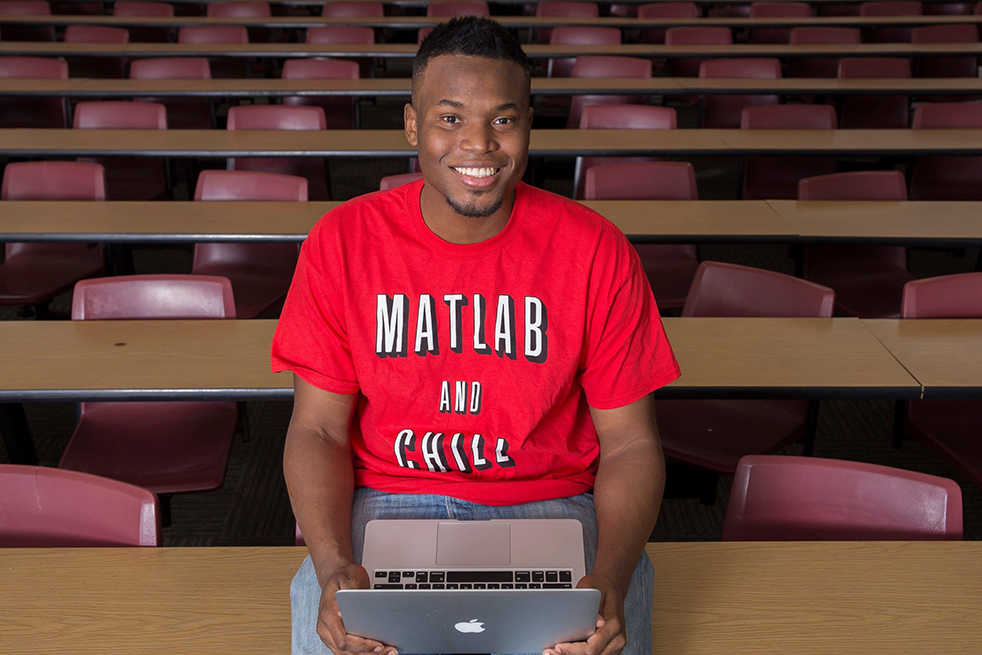Every semester, thousands of students are introduced to the MATLAB programming language in CS 1371. The course has historically been the low point for a large swath of first-year engineers, subjecting them to a difficult language and tedious work throughout the entire semester (or semesters) that they are forced to take it.
Under the leadership of masters student Kantwon Rogers, however, the course’s reputation may very well change.
Currently in his seventh year at the Institute, Rogers earned a Bachelor’s degree in Computer Engineering as well as a Masters in Electrical and Computer Engineering before moving onto his current degree program, a Masters in Human/Computer Interaction.
“I didn’t know what computer engineering was,” Rogers said of his initial choice of major. “I just kind of knew that I liked computers. My sister was a Computer Science major but I didn’t want to do that because she’d think I was following in her footsteps, so I literally chose the other major with ‘computer’ in it.”
That path led Rogers to CS 1371, a course that all engineers must take as an introduction to computer science. He then took on a position as a Teaching Assistant for the class, a role he filled for eight consecutive semesters.
“It was honestly the most transformative experience of my life,” he said of his time as a TA. “It’s when I started to realize that education, and specifically Computer Science education, was really important to me.”
After earning his Masters, a prerequisite for leading a lecture course, Rogers decided that it was time to take the next step.
“I already knew Bill Leahy,” Rogers said. “He’s in charge of hiring all the lecturers and everything, so I literally messaged him on Facebook and said ‘Hey, can I teach the class next semester?’ He said yes, no questions asked. It was great to see that they had a lot of trust in me to just kind of bring me on board.”
The course has already undergone changes with Rogers at the helm. Working with the course’s numerous TAs, he has taken steps to ensure that the workload is more manageable than its reputation implies. His research in computer science education has put him in a position for more “research-driven” ways of doing things, leading him to make changes to the structure of tests and homework. His age, too, has contributed to the new life he has breathed into the course.
“It’s the whole notion that they’re closer to me in the sense that they can kind of see themselves in me,” Rogers explained.
“If I can do it, then they can do it. And then, at the same time, I like to explain and do things very differently than what has been done in the past. That might just be because I’m younger and I know the value of enjoying your time and being in touch with current events. I have students that add me on Snapchat and things like that, and it definitely reduces that distance of ‘oh, he is the teacher, I cannot really talk to him.’”
While his age certainly makes him an outlier among Tech’s employees, he brings a lot more to the table than simply youthful energy.
“Me being a black male is very impactful, especially here at Georgia Tech,” Rogers said. “There are like 200 people employed in the College of Computing, and of the people who are actually teaching students, I’m one of like three black teachers. And there are only black men, no black women. So here at Tech, and especially in STEM, which is not really populated by minority students, seeing someone of color teaching a class gives you a role model. When I was a student I was craving that, and that need wasn’t
necessarily met.”
Once the Alabama native finishes his second Masters degree this spring, he plans to begin pursuing a PhD in the fall.
Beyond that, Rogers hopes to continue his work in education and, if his long term dream comes true, he hopes to open up a middle school.
